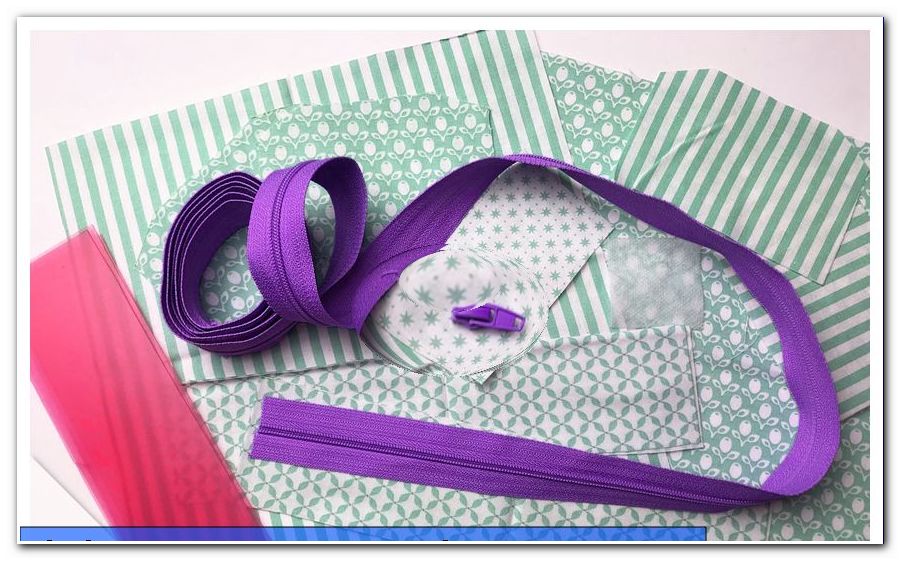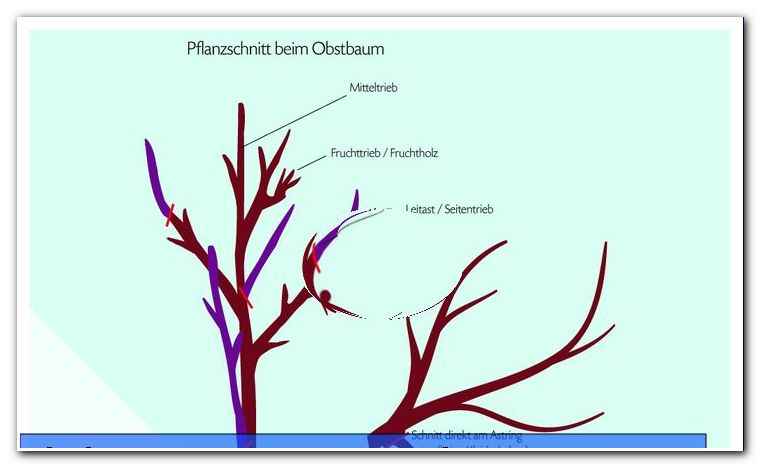Nature garden invest - close to nature, friendly, good

- Natural garden "create" - a misleading term
- General principles
- Floor care is essential
- Naturally maintained plants and soil
- Natural pesticides
- Plant the natural garden
- A new garden
- An existing garden
- The right attitude helps in the natural garden
- Why a natural garden keeps you healthy
More nature in the garden - not just in the countryside a trend that an increasing number of people want to follow. In the countryside, the natural garden can offer a welcome change from the monotonous farmland all around, in the city, the natural garden should and can bring back more nature to the city. Below you will find out how to create, design and plant a natural garden.
Natural garden "create" - a misleading term
The sense and charm of a natural garden consists precisely in the fact that it is not "created". At least not in the sense in which a garden is usually created. With a huge effort: A garden architect develops various ideas for garden design, one of these ideas is transferred to a design planning, in several nurseries and nurseries are sought exactly the plants that provides this plan, the soil in the various garden areas is prepared for the intended plants These are planted and often need special care. This causes quite considerable costs, because both the garden architect and the nurseries and nurseries and their employees who work on the garden, want money, not a little money. 
A natural garden is about creating a piece of nature that is ecologically balanced . The garden is also designed here, a garden is by definition a man-made natural area.
However, a natural garden is not "externally shaped" by altering the various areas in the garden by human (and perhaps chemical) intervention until a particular plant, which, of course, has not settled in that area, can grow there (can grow for a limited time and with a lot of care). But at the natural garden is simply worked with what is there.
The existing soil is considered, then plants are selected, which grow in such a soil - like to grow and without much care. These are almost exclusively native plants, gardeners rarely have the need to set a Japanese Zen garden next to a Brandenburg pine grove. If a natural gardener were to have that need, he would certainly try to find a balance between the two cultures and achieve the relaxing effect of a Zen garden through a slightly different arrangement of native plants. 
Usually, however, the naturalist will simply look at the surrounding landscape and will design his garden to blend in well with the environment. He still has more than enough design possibilities, especially nowadays, where he can resettle hundreds of nearly extinct plants in the region.
The "plant" of a natural garden thus consists to a large extent of the fact that you explore your own home and its flora. If you know which plants you want to bring in, they only have to be sensibly grouped and planted, carefully selected plants will grow without problems. So you do not need a landscape architect to design a natural garden, although of course there are landscape architects who specialize in natural gardens. However, it makes more sense - and in the long term more satisfying - if you yourself deal with your environment and your garden.
General principles
In the natural garden "nature should take place", and there are some basic rules that guarantee that this happens when you create a natural garden:
Floor care is essential
Plants grow in the soil, and in the natural garden, this soil should really be made of soil. From a soil that is commonly found in the region - this is the only way you can buy compost from the nearest public compost collection and bring in no problem, plant offshoots from the neighbor, ask for rare plants in the city nursery or in your region's botanical garden, for which in their area maybe even a resettlement project is carried out ... 
In a garden that has long been traditionally cultivated - based on the traditions of the last 40 years or so, ie not just traditional in the horticultural sense - a soil analysis is the first step towards a natural garden. Only such a soil examination gives you certainty about how it is ordered to your garden soil and how the way to the natural garden looks like. Soil surveys are often provided by the local environmental offices, there are special soil analysis laboratories (also near you), addresses, instructions for taking a soil sample, submitting the sample and interpretation of the results can be found on the Internet.
If you are lucky enough just doing nothing as a floor care or the omission of the introduction of harmful fertilizers, supplemented by a varied planting in mixed culture, often a green manure is advisable or necessary. In the case of a garden floor, which has long seen nothing but chemistry and monocultures, there are often few microorganisms to be found that work the soil and keep it healthy. Then a microbiological soil remediation can be the fastest way to a natural soil, in which to a natural garden suitable plant communities feel comfortable.
Naturally maintained plants and soil
Even in a natural garden your plants want to be supplied with nutrients. In the natural garden, however, synthetic fertilizers are handled with care, or better said, artificial fertilizers are not actually used at all. Each artificial fertilizer is produced under high energy and resource consumption, and he does not offer a really good plant nutrition: The nutrients in synthetically manufactured fertilizer are immediately available for plants, which is now no longer considered a reason to celebrate, so that's almost impossible to dose such a fertilizer properly. 
Therefore, from the published statistics of the soil laboratories it is constantly evident that most of the soils in home gardens are overfertilised (and these statistics only take into account the soils of home gardeners, who have already thought about soil and fertilization). The many fertilizer helps the plants then also little - they grow too fast, without proper training of their cell walls, pests and disease susceptible. What can not be processed by soil and plants with the best will, is then washed out into the groundwater ... For all these reasons, the natural garden uses only organic fertilizer, compost and earthworm humus, horn shavings and plant extracts.
Natural pesticides
In the natural garden, generally only a small amount of pesticides has to be used, because numerous beneficial insects settle in such a garden and assume these tasks. If, for once, diseases or pests occur, it is first checked whether they need to be fought at all, with low infestation pressure, the problem often resolves itself.

If measures are to be taken, ecologically sound procedures are used, which are first of all a variety of mechanical processes, from weeding to the showering of pests, then biological pesticides and plant tonic
- nettle liquid manure
- herbal broths
- plant extracts
- seaweed extracts
- oil emulsions
on the turn, then biological pest control. On not only the plants, but also harms the environment (and by the presumption of many professionals almost certainly harmful to humans) Fungicides, insecticides and herbicides a gardener completely renounces.
In the long term, the natural garden is to create its own ecosystem, which largely self-regulates. A large part of garden maintenance in the natural garden consists of considerations where interaction can be even better optimized. When creating a natural garden, however, the possibility of such an interaction must first be created, which is why natural gardens are so extraordinarily important for natural planting.
Plant the natural garden
If you want to plant a natural garden, it is essential that you plant this natural garden properly. Proper means, with plants that belong in a natural garden or at least not completely disturbing fall out of the frame: 
- Only when the soil is right, it can be planted naturally, to a soil analysis really do not come around before planting a natural garden.
- The natural garden is planted colorfully with various plants, in nature you will never find any monoculture.
- Rather, in nature, plant communities are formed for a good reason, within which each plant enters into a definite, meaningful relationship with its neighbor.
- You do not have to work through a complicated puzzle of planting plans that combine certain plants, because:
- In the natural garden belonged mainly native plants, best of all plants, which are native to your area.
- Of these native plants as original wild forms, not "genetically crippled" hybrids.
- These plants are planted where they have the best location in the garden, according to their needs.
If you do so, it will naturally be planted with suitable plants that have beneficial effects on each other. The more curious you are, the more old, almost forgotten species will track you down and settle in your garden, so not only will you help preserve a species-rich natural habitat, but you will do everything to develop a stable and resilient ecosystem in your natural garden.
A new garden
When it comes to turning the area into a natural garden in front of a newly built house, you are completely free to design, this is more about not acting too fast: 
- Before the installation of the garden, the preparation of the soil is here, depending on the state in several steps. Articles for garden preparation on a Neubaugrundstück can be found on the Internet.
- As you create this foundation, you can start choosing plants, especially plants native to your area.
- If you are curious and have a healthy appetite for adventure, you will try to get plants that will prevent them from extinction, thus helping to preserve biodiversity in your area.
- There are many sources where you could get such plants: in garden centers and botanical gardens (resettlement projects!), By neighbors interested in quality of life, by associations and swap boards committed to the preservation of biodiversity, all these sources promise a right inexpensive plant or seed procurement.
- Of course, there are also specialist gardeners who take care of the preservation of plant diversity, and seed kits that promote biodiversity, there are even in the next organic supermarket.
In addition to the larger plants that give the garden structure, you need then a number of matching ground cover and possibly plants for the greening of a walk-in area - which in the natural garden is not necessarily a lawn, but z. B. with English lawn chamomile or with quender or with lavender thyme is designed as a smell of grass. 
Where the roads remain "> An existing garden
An existing garden can be completely relaxed gradually transformed into a natural garden, kindly it will be at the same time gradually becoming easier to care for. Here are a few ideas for "every year a bit more natural garden":
- Just leave a few small corners in your garden of a self-determined development, for gardeners who are still very orderly, an exercise program for "tolerance with nature".
- Of course, for this experiment you may not choose the corner in which you planted the North Korean subversive knotweed years ago, but a piece of soil with indigenous plants.
- Next to this "Wildwuchs-Eckchen", a pile of deadwood and / or stones can join, and your garden has become a habitat for hedgehogs, insects and birds.
- In the next season, the filled, already morbid for many years breeding rose is replaced by an unfilled wild rose.
 And so on, and so on, every year upwards introduced principles and planting rules introduce more variety into the garden, biodiversity through many shrubs in a bird hedge, genetic diversity through ancient flower species such as daisies and gold varnish, bluestar and columbine, chicory and maiden in the countryside, cultural diversity by planting a Dülmener or Bohemian rose apple, a spout or a quince.
And so on, and so on, every year upwards introduced principles and planting rules introduce more variety into the garden, biodiversity through many shrubs in a bird hedge, genetic diversity through ancient flower species such as daisies and gold varnish, bluestar and columbine, chicory and maiden in the countryside, cultural diversity by planting a Dülmener or Bohemian rose apple, a spout or a quince.
The right attitude helps in the natural garden
Taking responsibility for your own garden is not impossible, even if you have to work a lot in your job. However, you will only be able to enjoy the associated gain of a truly relaxing garden if you adopt the attitude of a natural gardener right from the start, which means:
- Have patience, as an African proverb says, the grass does not grow faster if you pull at it.
- Indulgence towards unforeseen developments. If the plants in the natural garden do what they want, and you are angry about it, an Arabian proverb will help you: Do not worry about the rose bush bearing thorns, but be glad that the thorn bush is wearing roses.
- A certain frustration tolerance, if something goes wrong: That one believes in roses, that brings them to flower, says an old German proverb.
- An understanding of what belongs to nature:
The cheerful is every weed a flower, the afflicted every flower a weed, is a Finnish proverb.
These proverbs from different countries on the attitude to gardening culture did not all originate until yesterday, so the "special attitude of the gardener" is actually the normal attitude of a gardener. 
The proverbs illustrate very well what attitude promises you as a gardener most useful: See your garden as a natural environment in which you form nature, but nature has even a word to say.
Why a natural garden keeps you healthy
You could believe any source of information that assures you that spraying your plants and your garden floor with a variety of chemical nebulae every spring is no problem at all. Even though glyphosate is present in almost all weed killers (and the rest are not necessarily healthier either). Even though glyphosate is currently haunting the media again (April 2014) because it is suspected of causing cancer and other nasty diseases. Even if the Federal Council therefore calls for the use to be restricted. Even though our French neighbors recognize Parkinson's as an occupational disease caused by pesticides among farmers. Even though investigations have been made and published over and over again for years, glyphosate can be detected in food and feed grain, in daily consumption of cereal products and - logically only logically - in human urine. Whether running glyphosate intake in small amounts harms people has not been scientifically studied ...
Conclusion: The natural garden is not in vain right now so much on the rise - more nature in the garden means less gardening for you and will most likely bring you even more health.
Tips for quick readers:
- a natural garden is not difficult to create
- You just have to allow more nature in the garden
- with a good soil, which is maintained
- with native plants that are planted according to their needs
- without using chemistry




